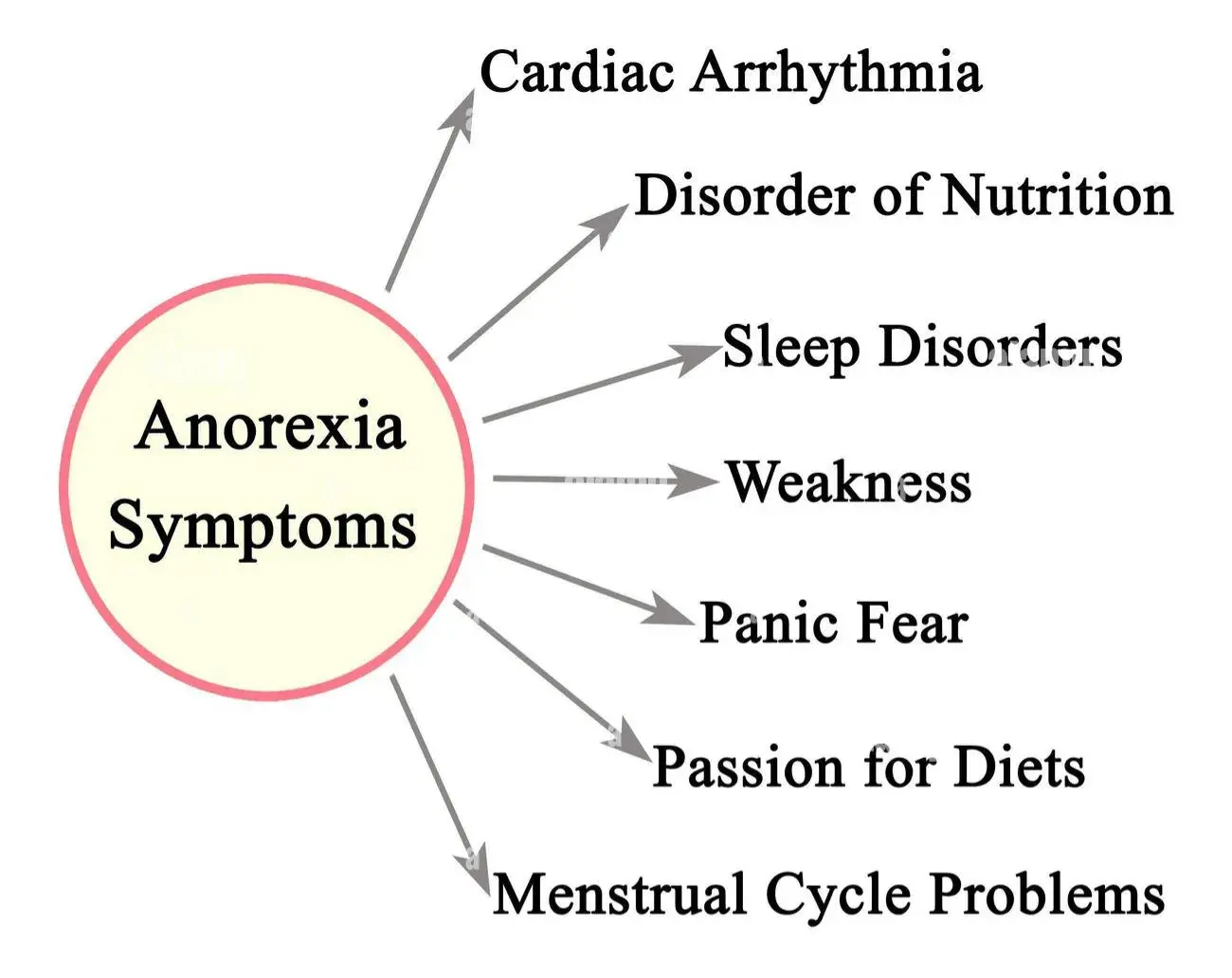Anorexia Nervosa is an eating disorder. Many people believe it is psychological or can be influenced by environmental factors. Its symptoms can vary from person to person, but some common signs include extreme weight loss, fear of gaining weight, distorted body image, restrictive eating, amenorrhea, irritability, depression, and many more. In this blog we’ll discuss about anorexia nervosa symptoms, Causes, Diagnosis, And Treatments.
Anorexia is often thought to mean simply "loss of appetite," but that's a bit misleading. People with anorexia nervosa do experience hunger, but the challenge lies in their intense fear of gaining weight or appearing fat. Even if they're actually thin, they might see themselves as overweight and tie their self-worth to being thin. To address this, they may limit their food intake severely and engage in excessive exercise to lose weight.
It's important to know that not everyone with anorexia is visibly underweight. In fact, a study showed that less than 6% of people with eating disorders were underweight. Experts now emphasize that anorexia can affect individuals with larger bodies as well. About 9% of people in the U.S. will experience an eating disorder at some point in their lives, emphasizing the need for awareness and understanding of these complex issues.
What is anorexia nervosa?
Definition of Anorexia Nervosa: Anorexia is also known as Anorexia Nervosa. It is an eating disorder and also a state in which a person has a different relationship with food and self-image.
What are anorexia nervosa symptoms?

The signs and symptoms of anorexia can be related to the feeling of starvation and can also include signs and symptoms that can have emotional and behavioral issues involving the unrealistic perception of body weight and can also be extremely strong in terms of gaining weight and becoming fat. It can be difficult to notice signs and symptoms becoming what is considered lower body weight for each person. Some individuals may appear extremely thin and often disguise themselves as having thinness, eating habits, or physical problems.
Physical symptoms of Anorexia Nervosa are-
-
Thin appearance
-
Abnormal blood counts
-
Dizziness or fainting
-
Discoloration of the nails & fingers
-
Hair that thins breaks or falls out
-
Absence of menstruation
-
Dry or yellowish skin
-
Irregular heart rhythms
-
Dehydration
Other emotional and behavioral symptoms of Anorexia Nervosa-
Anorexia can include the following behavioral and emotional symptoms that can consist of an attempt to lose weight.
-
Restrictive intake of food items through dieting or fasting every day.
-
Exercising excessively
-
Binge eating or self-inducing in the purge.
-
Refrain from eating any meals more than enough times.
-
Eating only a few safe foods that have lower calories and fat content.
-
Adopting rigid meal plans and eating rituals like spitting food out after chewing
-
Not wanting to eat in public
-
Having issues about food or lying about the amount that you have eaten.
-
Checking the mirror constantly to see how you look
-
Covering up in layers
-
Complaining about being fat or having fat body parts
-
Negative self-image
-
Social withdrawal and irritability with insomnia or reduced interest in hobbies.
What causes anorexia Nervosa?
Potential Causes of Anorexia are mentioned below:

The causes of anorexia nervosa are not known. It is probably a combination of biological, psychological, and various environmental factors.
Biological- Whether genes are involved in the causes of anorexia or not is not clear, and there can be genetic factors that can put some people at a more than average risk of developing anorexia. Some people can have genetic tendencies towards perfectionism, sensitivity, and preservice are more likely to have traits of anorexia.
-
Psychological- People with Anorexia can have obsessive-compulsive disorder and can have personality traits that can make it easier to stick to a strict diet and leave food at all times. They tend to lose their hunger and focus on extreme weight loss. They can be due to perfectionism or higher anxiety levels, and they can engage in restrictive eating to reduce weight loss.
-
Environmental- Modern western cultures can emphasize thinness and success, and worth is often equated with being thin or having lesser body mass. However, peer pressure can also help fuel the desire to be light and can be a higher chance of younger girls developing anorexia.
Diagnosing Anorexia Nervosa
Diagnosing anorexia nervosa is crucial. It's not simply about a number on the scale; it's a detailed assessment of physical, psychological, and behavioral factors.
Physical Examination
-
Vital signs: Checking heart rate, blood pressure, and temperature can reveal signs of malnutrition, dehydration, or electrolyte imbalances.
-
Weight and body mass index (BMI): While not the sole determinant, significantly low weight or BMI compared to age, sex, and height raises suspicion. So, check your weight according to anorexia nervosa bmi metrics.
-
Physical appearance: Signs like dry skin, brittle nails, hair loss, and muscle wasting can indicate nutritional deficiencies.
Psychological Evaluation
-
Clinical interview: A mental health professional explores the individual's thoughts, feelings, and behaviors related to food, weight, and body image. This helps uncover distorted cognitions, fear of weight gain, and obsessive calorie counting.
-
Diagnostic tools: Standardized questionnaires and assessments like the Eating Disorder Examination-Questionnaire (EDE-Q) can help evaluate symptoms and severity.
-
Comorbid conditions: Assessing for co-occurring mental health issues like depression, anxiety, or obsessive-compulsive disorder is crucial for treatment planning.
Eating History
-
Dietary patterns: A detailed food diary or discussion about meal frequency, portion sizes, and food avoidance reveals restrictive eating habits or purging behaviors.
-
Cooking and meal preparation: Examining the individual's involvement in food preparation, even if they don't eat much themselves, can be telling.
-
Relationship with food: Exploring emotions and anxieties surrounding food and mealtimes provides valuable insights.
Diagnostic anorexia nervosa dsm 5 criteria
The Diagnostic and Statistical Manual of Mental Disorders outlines the specific diagnostic criteria for anorexia nervosa dsm 5. These include:
-
Restriction of energy intake relative to requirements, leading to low weight in the context of age, sex, developmental trajectory, and physical health.
-
Disturbed body image: significant overestimation of body shape or size, or persistent denial of the seriousness of current low body weight.
Fulfilling at least one of the first two criteria along with the third criteria is necessary for a diagnosis of anorexia nervosa.
Anorexia Nervosa Treatment
A healthcare professional and psychiatrist can work together to arrange for a comprehensive plan for the specific needs of the individual's news. A team of specialists can overcome the physical, emotional, social, and psychological challenges faced by the patient of anorexia. Some of the anorexia nervosa treatments method can include the following-
-
Cognitive behavioral therapy- A therapy that works on finding different ways of thinking, behaving, and counseling or management of stress for the patients
-
Counseling of the patients by family members of individuals having anorexia
-
Nutritional therapy of developing a relationship with food.
-
Medication to treat the symptoms of depression and anxiety
-
Supplement to resolve the nutritional deficiencies in the body.
-
Getting admitted to the hospital if the need arises.
Family and friends can provide crucial support and identify the patient's signs and symptoms. They can also help prevent relapse with treatment of anorexia nervosa.
Therapy & Medication for Anorexia Nervosa
- Cognitive behavioral therapy is often used to help identify and modify dysfunctional thoughts related to body image and food.
- While no medications specifically treat anorexia, antidepressants, antipsychotics, and appetite stimulants may help manage symptoms.
- Nutritional counseling by a dietitian is critical for establishing healthy eating patterns and meeting calorie goals during anorexia recovery.
What are the Complications of anorexia?
The complications of anorexia can range from different bodily functions and they can include problems with the-
-
Cardiovascular system
-
Having a low count of RBCs and WBCs
-
The digestive and urinary system
-
Hormonal imbalances
-
Losing bone strength.
Many of these points can be life-threatening, and in addition, there can be a severe impact of poor nutrition on the brain of the patients, which can increase the chances of suicide in individuals.
When do you require hospital care?
A person can require care when they have-
-
Severely low body weight or lower-than-ideal anorexia BMI.
-
Patients have extreme malnutrition.
-
A complicated or severely less intake of a few food items.
-
A refusal to eat food in Fear of gaining weight
-
Needing psychiatric care or help.
Treatments can help the patient gradually increase food intake and restore the overall health of individuals.
Conclusion-
So, to sum it up, we've talked about all the potential causes, symptoms, diagnosis, and ways to deal with anorexia nervosa. If you're seeing improvements in anorexia nervosa symptoms, that's a good sign of beating. But if your weight loss has gone too far, it's essential to consider getting hospital care or specialized help for the best recovery.
Popular Searches:
Kill tooth pain nerve in 3 seconds permanently | how to get unbloated in 5 minutes | how i cured my eustachian tube dysfunction | how to make yourself sick | ligma disease | how to maintain erection for 30 minutes | heart stent surgery | how i cured my lichen sclerosus | allergic asthma | signs of prostate cancer | ankle strain vs sprain | keytruda side effects | foods that cause acid reflux | supplements to lower blood pressure | multiple sclerosis symptoms | can you drink alcohol while breastfeeding | dry skin in winter | joint pain causes | uterine fibroids symptoms | What are the benefits of Fenugreek | ketamine infusion | social anxiety test | When Am I Ovulating | Benefits of Dermaplaning
Frequently Asked Questions
What are the causes of anorexia in humans?
A person with anorexia is likely to have a family member with this health problem. This condition includes weight problems, physical illnesses, and mental health problems. Mental health problems can be depression or substance abuse.
What are the signs of anorexia?
The common signs of anorexia are pursuing weight control and obsession, having food and calorie issues, changes in mood and emotional states, excessive exercise problems, denial of hunger, and refusal to eat anything.
Is anorexia a serious health cancer?
Anorexia is an eating disorder and can cause severe mental health conditions. People having anorexia can try to keep on losing weight and will not be eating enough food or exercising too much. This condition can make them more ill and start to starve.
When does anorexia become serious?
The disorder can become more serious when a person weighs at least 15% less than their ideal body weight. Extreme weight loss can lead to dangerous health problems and even death.
What is a typical characteristic of anorexia nervosa?
A typical characteristic of anorexia nervosa is an intense fear of gaining weight, leading individuals to restrict their food intake significantly, often resulting in extreme thinness.

Reviewed by







